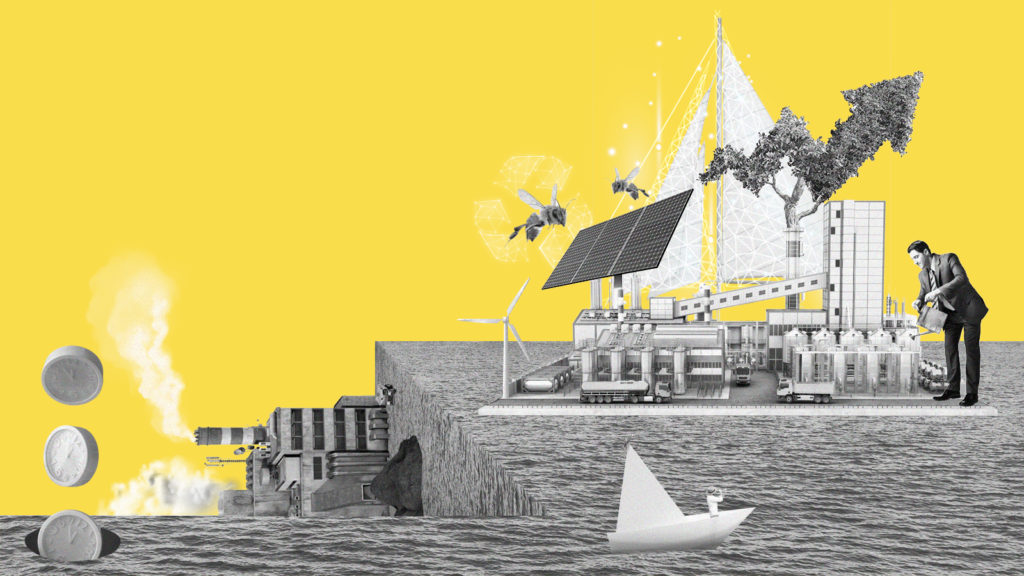Sustainability has long since ceased to be just a social responsibility issue. It has become an aspect that points the way for a successful future for production companies. Because it is no longer just about a good conscience and image, but about compliance with regulations, market positioning and mostly due to environmental urgency.
Sustainable production means manufacturing products using processes and systems that are not harmful to the environment, conserve energy and natural resources. are economically viable, and safe and healthy for employees, the public and consumers.
More than just a flag in the wind
Large complex production lines and supply chains can be a risk to the environment and human rights. This involves, for example, untreated material waste and wastewater, and greenhouse gas emissions as environmental risks and child labour as human rights risk. These are only a few of the main negative externalities that can be caused by the supply and value chains of the manufacturing sector. Aspects that are so intolerable.
“The pressure from politics on companies is increasing: The EU Parliament, through the members of the Legal Affairs Committee, published an opinion at the end of January 2021 on the newly adopted EU law, which is intended to hold companies responsible for damage they cause to people and the environment through their value chains.” – Francisco Carrera, project manager at Germanedge and expert on sustainability
This regulation includes, among other things, that companies identify, address and remedy human rights and environmental impacts throughout their value chains according to their due diligence. The rules are to apply to all companies operating in the EU’s internal market. In the event of non-compliance, there is a threat of sanctions and a ban on the import of products associated with serious human rights violations such as forced or child labour.
The sails must be set
Waiting and letting things drift is no longer an option when it comes to sustainability. Companies must become active and put the topic on their strategic agenda. The most important factors of sustainability in the production environment are:
- Energy & power: CO2 emissions and their respective equivalents, as well as carbon neutralisation and compensation.
- Raw materials: waste, taking into account the recyclability of materials and the use of already recycled materials in the production line as raw materials
- Water: waste water and the corresponding treatment.
Other aspects to consider are:
- the impact on biodiversity and the environment in the areas of raw material extraction
- compliance with environmental regulations
- the environmental assessment of a company’s suppliers
Before any strategic measures can be considered, one thing must be in place: complete transparency. In times of global, highly complex production chains, this is an enormous challenge. This cannot be solved manually. But with increasing digitalisation and technological possibilities, there is the potential to use the existing amount of data.
Wind in the data sail
Intelligent software solutions can help in the first step of integrated data management to create the transparency mentioned. But there is much more potential in production data that companies should take advantage of.
“Software programmes can cover various aspects of sustainability. But the key element here is to be able to make the connections and compatibility between different parameters and data frameworks.” – Francisco Carrera
A forward-looking software solution to support sustainable production should therefore not only collect and manage data, but:
- Provide analysis both prescriptively and predictively.
- Generate pertinent information for reports based on established reporting methods and guidelines such as GRI, CDP, SASB, GHG Protocol and others.
- Provide insights into the life cycle of products, including for example aspects of circular economy, life cycle assessment, economic input and output.
Land in sight
It is almost impossible to make forecasts in today’s disruptive times. But looking at current developments, it is possible to identify trends in how the issue of sustainability might evolve in the manufacturing environment over the next decade.
“There will be in the near future more efficient and relevant linkages between the private sector, think tanks, manufacturing organisations, NGOs and government to address sustainability issues.” – Francisco Carrera
In addition, the circular economy should be much better implemented, with, for example, life cycle analysis fully integrated into production lines and the entire supply chain.
Sustainability is an issue that manufacturing companies need to actively address. Circumstances are getting harsher, competition tougher. But the sustainability aspect can be seen as part of the transformation of production to the smart factory. With an integrated, strategically thought-out digitalisation approach, various urgent topics can be taken into account – and the ship can be brought safely to shore despite sometimes rough seas.
Have your data sails been hoisted yet? Read here how you can use the full driving force of data with an integrated platform solution and bring your production to the destination of your version of the Smart Factory!
